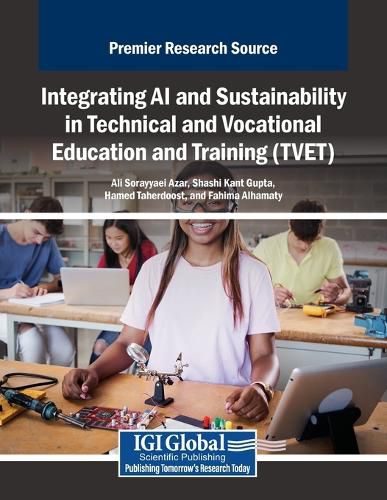Readings Newsletter
Become a Readings Member to make your shopping experience even easier.
Sign in or sign up for free!
You’re not far away from qualifying for FREE standard shipping within Australia
You’ve qualified for FREE standard shipping within Australia
The cart is loading…






This title is printed to order. This book may have been self-published. If so, we cannot guarantee the quality of the content. In the main most books will have gone through the editing process however some may not. We therefore suggest that you be aware of this before ordering this book. If in doubt check either the author or publisher’s details as we are unable to accept any returns unless they are faulty. Please contact us if you have any questions.
As industries worldwide adopt advanced technologies and sustainable practices, the role of technical and vocational education and training (TVET) is evolving to meet these new demands. TVET institutions must now integrate artificial intelligence (AI) and sustainability into their programs to produce a workforce equipped with future-ready skills. By incorporating AI tools and sustainable practices into TVET curricula, educators can provide learners with the competencies to thrive in green technologies, smart manufacturing, renewable energy, and other emerging fields. This integration empowers individuals with new skills and contributes to a more sustainable, resilient global economy. Further exploration may bridge the gap between technological advancement and environmental responsibility. Integrating AI and Sustainability in Technical and Vocational Education and Training (TVET) provides a comprehensive guide on how TVET can successfully incorporate technological elements, addressing the frameworks, strategies, best practices, and challenges associated with this transformation. It supports educators in navigating the complexities of integrating AI and sustainability into vocational training. This book covers topics such as cybersecurity, data science, and supply chains, and is a useful resource for business owners, engineers, educators, academicians, researchers, and data scientists.
$9.00 standard shipping within Australia
FREE standard shipping within Australia for orders over $100.00
Express & International shipping calculated at checkout
This title is printed to order. This book may have been self-published. If so, we cannot guarantee the quality of the content. In the main most books will have gone through the editing process however some may not. We therefore suggest that you be aware of this before ordering this book. If in doubt check either the author or publisher’s details as we are unable to accept any returns unless they are faulty. Please contact us if you have any questions.
As industries worldwide adopt advanced technologies and sustainable practices, the role of technical and vocational education and training (TVET) is evolving to meet these new demands. TVET institutions must now integrate artificial intelligence (AI) and sustainability into their programs to produce a workforce equipped with future-ready skills. By incorporating AI tools and sustainable practices into TVET curricula, educators can provide learners with the competencies to thrive in green technologies, smart manufacturing, renewable energy, and other emerging fields. This integration empowers individuals with new skills and contributes to a more sustainable, resilient global economy. Further exploration may bridge the gap between technological advancement and environmental responsibility. Integrating AI and Sustainability in Technical and Vocational Education and Training (TVET) provides a comprehensive guide on how TVET can successfully incorporate technological elements, addressing the frameworks, strategies, best practices, and challenges associated with this transformation. It supports educators in navigating the complexities of integrating AI and sustainability into vocational training. This book covers topics such as cybersecurity, data science, and supply chains, and is a useful resource for business owners, engineers, educators, academicians, researchers, and data scientists.